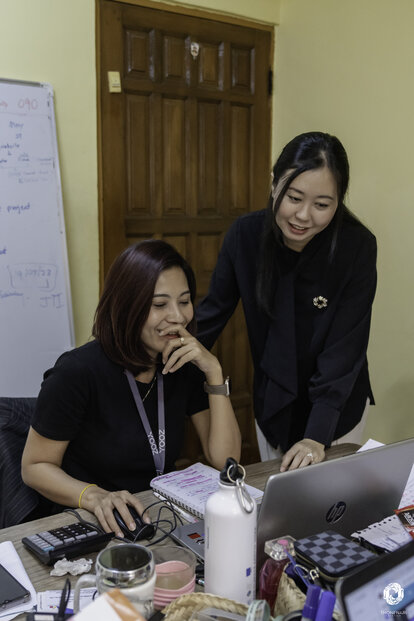women to women
Environmental Conservation and Women's Participation
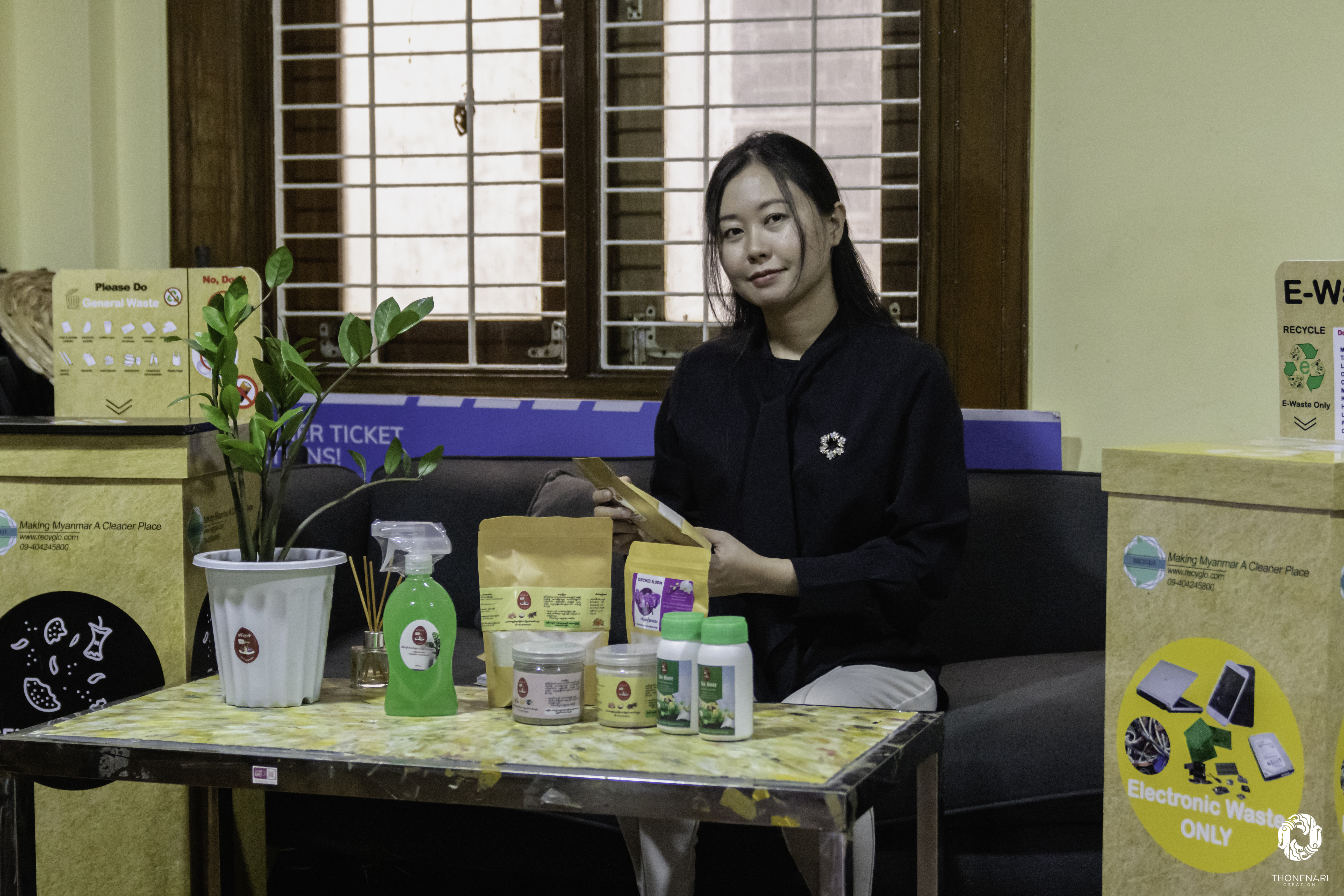
(1)Question: Please tell us about your role and responsibilities at Recyglo.
Answer: My full name is Shwe Yamin Oo, and I am the CEO at Recyglo. We started Recyglo in 2017. The company is based in Singapore. We have founded the company in four other countries.
(2)Question: Why did you come up with the idea to start Recyglo?
Answer: Actually, I didn't start it thinking it would become something big. After finishing school, I entered the business world. It was difficult to find a job at that time. The available jobs require a lot of knowledge and experience. So instead of going that route, I wanted to try doing something I was passionate about. Initially, I tried small businesses and also helped with the family business. As I continued, I realized that running a business alone wasn’t as impactful as working in a group, ideally with 2 to 5 people. I looked for a co-founder but didn’t find anyone. Most people had full-time jobs, some were well-paid, and others were homemakers who weren’t very interested in this kind of business. However, I wanted to prove that I could do it. It’s hard to find people with similar passions. That's when I stumbled upon the creation area. A friend introduced me to a program at Creation, a 9-day competition. There, I had to pitch my idea. I considered two things: if I pitched my idea, someone else would have to join me; a team of at least two was needed. If I was alone, no one would accept my idea. So I had to make my idea appealing enough for someone else to accept it. Alternatively, I could join someone else's idea, which meant I had to listen and see what others were proposing. Many ideas were about car parking, electricity, online shops, delivery services, fashion, and agriculture. I was interested in their ideas, but I was afraid they wouldn't accept me if I approached them. I also wanted to pursue my own idea. In such a competitive situation, I thought more about the community than just my own interests. I realized we needed to address waste management, especially since Myanmar is a developing country lacking proper education and waste disposal. People were dumping waste into rivers. So, I created a platform for systematic waste disposal. People who wanted to dispose of waste or sell recyclable materials could use our platform. We started with a page like that. I then found team members during the 9-day competition. Everyone liked the idea of cleaning and tidying up the trash. After the 9 days, we won the people's choice award. Everyone voted for which team they liked best. We won the prize, which was $5000, paid in installments. They didn't just give us the money; we had to flesh out the idea. So I had to meet people who collected trash and dealt with buying and selling recyclables. We did research and presented it to them. We could only win the prize if it was feasible. We had to demonstrate it. We bought milk bottles and sold them using a truck, a memorable experience. Then we were encouraged to start a company. We registered the company and eventually received the entire $5000 prize. That money was used for starting the company and other sales-related expenses. Later, Creation offered us another opportunity. They had a program where, if selected, they would invest $25000 as pre-seed funding. At that point, I had 5 team members, all of whom I had just met and formed a team with. I asked them all if they could do it. The reason I was concerned was that I was the oldest and most experienced in the group. Also, I was already appointed as the CEO. I wasn’t sure whether to join or not. If I did, what would I do? I didn’t want to misuse someone else’s money. If I led the team and they failed, it would be my responsibility. I didn’t want to lose face. Some were still in school, others didn’t want to leave their well-paying jobs or take the risk. Some even questioned how much they would be paid. I couldn’t pay them a company-level salary; only a small amount. Some were already working in NGOs with good salaries, so they didn’t join. So we continued with just 3 of us. We faced many challenges ahead.
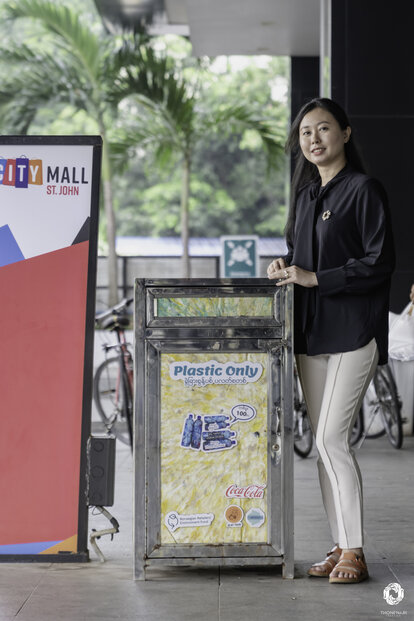
(3) Question: As a woman involved in the environmental sector, what challenges did you face at the beginning and during the course of your business?
Answer: In any business, when you take responsibility, solving problems becomes a primary task. In my case, initially, I received a lot of support because I was entering the environmental management sector. People supported it; it’s something that should happen in Myanmar. Myanmar needs cleaning up, and the community was supportive. I received a lot of attention from the media. Being a woman and founding this venture, I said I would solve these big problems. Some people say, instead of changing the world, change yourself first. "You are doing stupid things," they'd say. But for me, it’s right for both the community and myself. If I only look at my own interests, what happens if I don’t benefit? It’s not just about me; it’s about the community. If the business succeeds, it would not only be beneficial for me but also a great service to the community. That makes it more meaningful and fulfilling. With this mindset, I received a lot of support and energy to overcome challenges. The community was supportive, and there were even investors who believed in us and invested. As for the team members I worked with, some might have chosen different stable jobs, but they stuck with us, contributing from the start. Now, having been running together since 2017, it's been about six years of striving together.
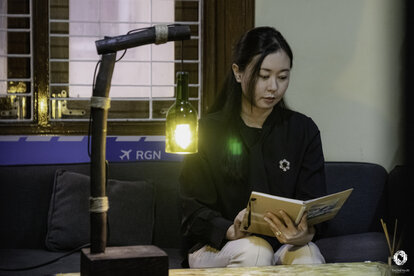
(5) Question: As the founder, how did you strive to sustain this startup over a long period, and how did you overcome the challenges encountered along the way?
Answer: The main thing is about giving back. If you want to give, you need to have something to give. So now we offer internships. We teach and train them. Then, we provide work for interns. When we finished school, we didn't get jobs due to a lack of experience. So, for them, we don't want the issue of not getting a job due to no experience. We will teach them when they come to us. After finishing the internship, they can apply for jobs elsewhere. Some might not succeed in finding jobs right away, but they do eventually. However, after three months, we let them go. They must understand the value. If they perform well, we keep inviting them back. So if you want to continue, like I said earlier, you can give only if you have something. Now, I have my own business, so I can do whatever activity I want, and I can implement any idea I have. But if I didn't have my own company or team, no matter how much I wanted to contribute to the environment, I wouldn't be able to do anything. So as long as this company exists, how much can we support this community? We will do as much as we can. If it didn't exist, we would have to say it’s over. With these considerations, we keep persevering.
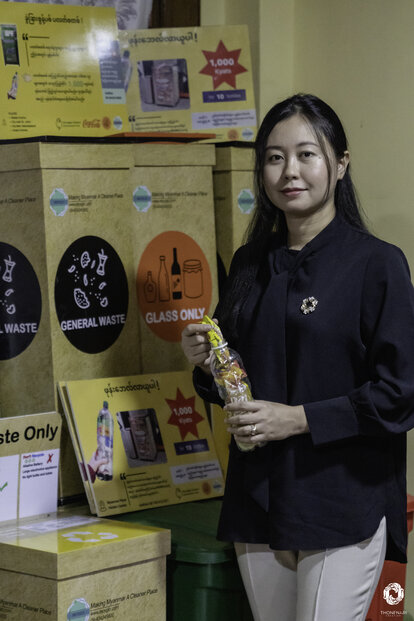
(4) Question: As the CEO, could you explain your plans for the next 5 to 10 years?
Answer: The goal from the start was to make recyglo a global name. In these six years, we've managed to officially register in 5 ASEAN countries. For the next 5 to 10 years, I'm certain that we'll reach a global level, possibly in a European country, Africa, or the Middle East like the UAE. At least, we should be established in one such place. Another contribution is about climate change, which is happening now. Only by adopting good environmental practices can we mitigate the effects of climate change, even though we can't completely stop it. So, I hope that in the next 5 to 10 years, we will reach a global level.
(6) Question: What advice would you give to women who want to start their startups?
Answer: Like I said before, if you haven't completed your education, finish it first. If you haven’t built your career yet, build it first. Another thing I want to say is that many women in Myanmar, typically housewives, have friends who get married and have children. They often have to stay at home until their children are around five years old and ready to go to school. How should I put it, they want to work outside, they want to work but their husbands would say "I'll earn for us, you just take care of the child at home." It's kind of a sweaty talk, right? Parents also say things like "What are you going to work for? How much will you earn?" So, they prepare to go outside but then are pulled back and end up back at home. Then they're not satisfied. They feel like their life has stalled. They want to break out but, like I said before, the pull from behind is strong, so they can't break free. So, what I want to say to women is, if you have something you want to do, there are things you can do to balance work and life. Just break out. Listen to what your inner self says. If you want to do it, it's not primarily about making or not making money. Initially, it's not important but later it becomes important. So, don't invest all of your money, like if you have 100, don’t invest all 100. Invest maybe 40, if you can afford to lose that much. The rest should be kept as backup for yourself. Some people take too much risk and when it doesn’t work out, they either ruin their life or end up in debt. So, take a risk that you can handle. That's all I want to say.
